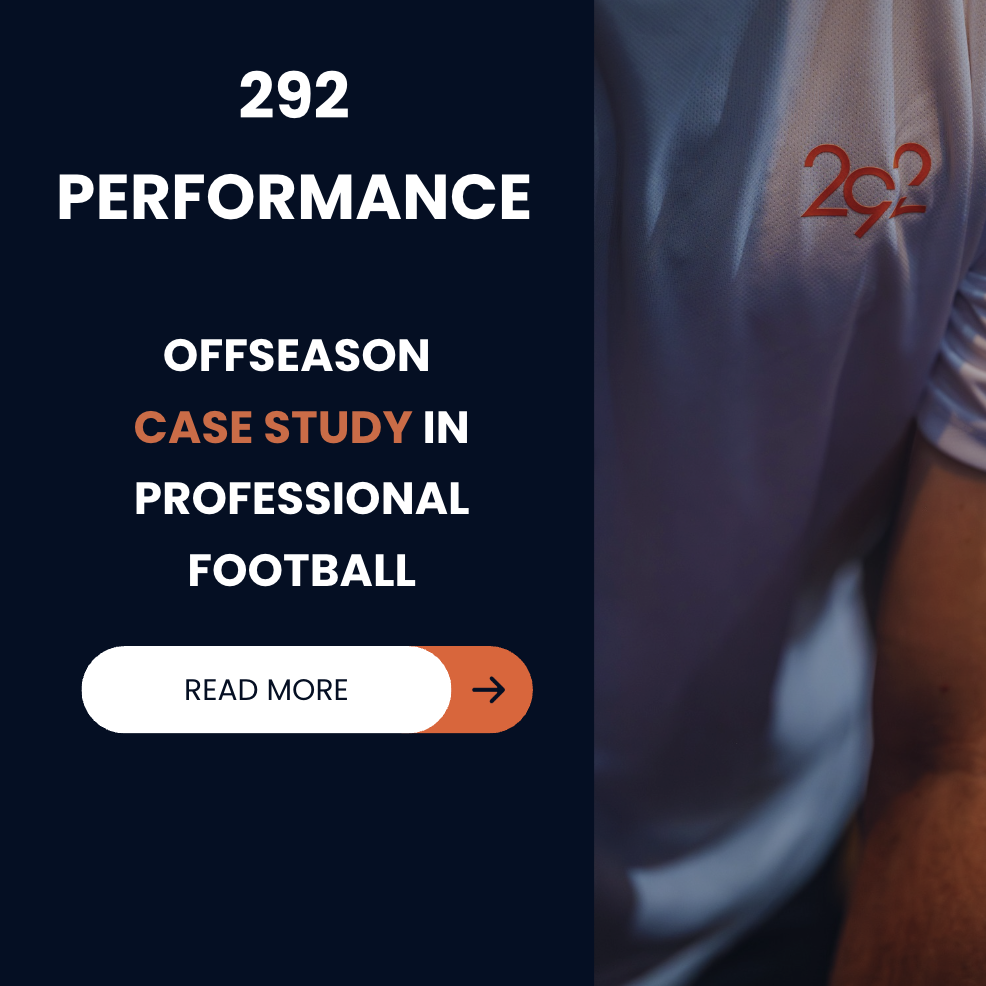In this article, we explain how the 292 Performance team planned and implemented a 4-week off-season training block for an athlete following a long professional football season.
Phase One: Performance Planning
At the start of the 292 Performance journey, 292 Performance prioritises understanding the athletes we work with and their current support networks. A full situational analysis was undertaken, formulating areas where the 292 Performance team can add impact to the athlete’s training and development, both short term and longer term. We spent time listening and discovering the aspirations, goals, and needs of the athlete.
After a thorough situational analysis with the athlete and their support team, 292 Performance identified key areas to focus on during the offseason:
- Health and Resilience
- Movement Restoration and Conditioning
- Aerobic Conditioning
- Strength Training Tolerance
- Variety and Motivation
An individualised biomechanical analysis, using AI-driven technology, was conducted at a private facility in London and a full physical profiling report was created, communicated and shared with all stakeholders.
The following physical objectives were deemed important to be considered and achieved for the athlete to achieve their goals
KPIS
- Hamstring strength (>5N/Kg)
- Lower body reactivity (>3.0)
- Trunk endurance (>2’)
- Rest Q questionnaire (increase recovery, decrease stress)
- CMJ Height >50cm CMJ
- RSImod >0.65
- Weekly high-speed running volume (2500m)
Collaborative Process
The whole offseason process was designed in collaboration with the athlete, their offseason schedule, club and current support team. It included the following elements to help the athlete achieve the goals set out at the beginning of the process:
Daily Movement Work: Small doses of movement capacity work to be incorporated as a pitch-based warm-up.
Pitch-Based Conditioning: This includes tempo runs (speed conditioning), position-specific drills, maximum aerobic speed runs, and fitness testing.
Daily Strength Training: Focused on pre-season preparation and increasing hamstring strength and coordination.
Physical Profiling and Sprint Technique Analysis: These were used to tailor strength training and running drills.
GPS Monitoring: GPS data to be analysed to build towards preseason on return to the club environment
Varied Training Environments: Different training centres and environments were to be used to stimulate motivation.
Monitoring
During the offseason, managing and monitoring fatigue and nutrition is important. The initial loading schedule below was created by the 292 Performance team:
Training Volume Management: Training volume was built up throughout the first six days, then decreased with increased intensity leading up to preseason.
Rest and Recovery: Day 7 was scheduled as a rest day to allow for adaptation.
Diverse Training Partners: Day 8 included training with other athletes preparing for the Olympics to add variety and different training partners.
Expert Coaching: Speedworks, an elite sprinting company, were brought in on Day 9 to improve and analyse sprint technique using unique AI technology. The findings above show that the athlete was the fastest team sport athlete ever tested by Speedworks. Improvements could still be made to increase the efficiency of sprinting
Phase Two: Performance Monitoring
Forecasting
With the help of our in-house data scientist, 292 Performance examined key performance data markers to understand how the athlete reacted to training loads and stimulation.
292 Performance anticipated high fatigue levels in the first week, which were expected to drop by days 10-11. If fatigue levels did not follow this pattern, training intensity would be adjusted accordingly. Nutrition was tailored to accommodate training loads and decrease body mass, with a nutritionist, from Intra Performance Group, present at several sessions to provide 1:1 support.
Objective physical and wellbeing measures were to be taken on Days 2 and 11 to gauge and measure progress. Each football session was measured with STATSport GPS.
This comprehensive, detailed, individualised approach ensured that the athlete was well-prepared for the upcoming season, both physically and mentally.
At 292 Performance, our goal is always to provide the highest level of support, collaborate with support systems and use data-driven insights and expertise to help athletes add impact to their performance.
Phase Three: Performance Coaching
Coaching
We used the unique data insights and our experience of coaching athletes to establish pre-training, S&C rehabilitation and recovery programmes during this offseason. Programmes were shared via an app which allows collaboration and all stakeholders to see the programme, monitor progress and access content. 292 Performance collaborated with various professional clubs from other disciplines to exposure the athlete to new training environments and train with other elite athletes preparing for the Olympic Games, International Fixtures and Premier League titles.
Results
Below are various key markers measured and monitored during the offseason camp which aligned with the player’s goals:
- Health and Resilience
- Movement Restoration and Conditioning
- Aerobic Conditioning
- Strength Training Tolerance
- Variety and Motivation
Distance: 17 Km total in 6 days which is lower than expected for preseason. However, the intensity of these sessions were supra-max.
Match Specificity: 1444 relative high speed running is 1.5x match-based high-speed running
Heart Rate: Every rep >90% of Max heart rate which supports aerobic power adaptations

To learn more, please contact the team at info@292performance.com













